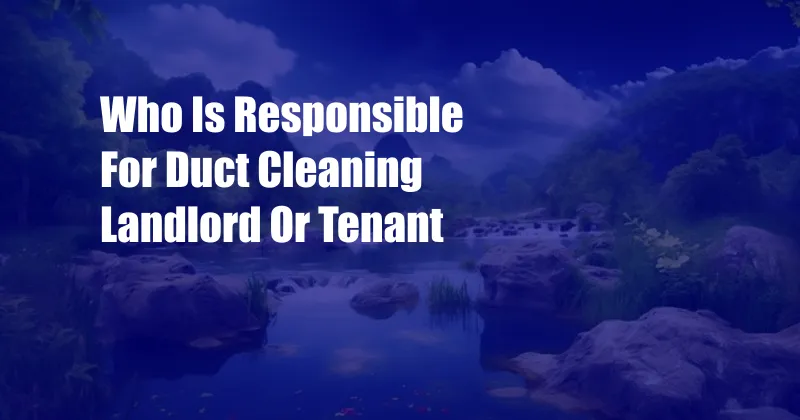
Who Bears the Responsibility for Duct Cleaning: Landlord or Tenant?
Navigating responsibilities in a landlord-tenant relationship can be a complex endeavor, especially when it comes to maintaining a property’s cleanliness and functionality. Among the various household tasks, duct cleaning often sparks confusion regarding who should take on the responsibility – the landlord or the tenant. In this comprehensive guide, we delve into the intricacies of this issue, exploring legal obligations, industry best practices, and practical considerations to help you determine who is accountable for this essential task.
Before delving into the specific responsibilities, let’s establish a clear understanding of duct cleaning. Duct cleaning involves the removal of dust, dirt, and debris that accumulate within the ductwork of a heating, ventilation, and air conditioning (HVAC) system. Regular duct cleaning ensures optimal airflow, improves indoor air quality, and promotes the efficient operation of the HVAC system, ultimately enhancing the comfort and health of the occupants.
Landlord Responsibilities
In general, landlords are responsible for maintaining the overall habitability and functionality of the rental property, which may include duct cleaning. This obligation stems from the landlord’s duty to provide a safe and healthy living environment for tenants, as outlined in most residential lease agreements. Specific landlord responsibilities related to duct cleaning may vary depending on local laws and the terms of the lease agreement, but generally include:
- Ensuring that the HVAC system, including the ductwork, is in good working order at the start of the tenancy.
- Addressing any issues or repairs related to the HVAC system, including duct cleaning, in a timely manner.
- Providing clear instructions to tenants on how to use and maintain the HVAC system, including any specific requirements for duct cleaning.
Tenant Responsibilities
Tenants also have certain responsibilities when it comes to maintaining the rental property, including the HVAC system and ductwork. These responsibilities typically involve日常 upkeep and proper usage of the system, and may include:
- Keeping the HVAC system clean and free of debris by regularly changing air filters, dusting vents, and cleaning accessible parts of the ductwork.
- Reporting any issues or concerns related to the HVAC system to the landlord promptly.
li>Using the HVAC system in accordance with the landlord’s instructions and avoiding any actions that could damage the system or ducts.
Determining Responsibility in Specific Situations
While the general guidelines outlined above provide a good starting point, determining responsibility in specific situations can be more nuanced. Here are some common scenarios and how responsibility is typically assigned:
- Regular Duct Cleaning: In most cases, the landlord is responsible for regular duct cleaning to maintain the overall functionality and habitability of the property.
- Tenant-Caused Issues: If the need for duct cleaning arises due to the tenant’s actions, such as excessive smoking or pet dander accumulation, the tenant may be responsible for the cost of cleaning.
- Pre-Existing Conditions: If the ductwork was already in poor condition or had not been cleaned prior to the tenancy, the landlord is likely responsible for addressing the issue.
- Lease Agreement Stipulations: The lease agreement may contain specific clauses outlining the responsibilities for duct cleaning. If so, these clauses will govern.
Tips for Landlords and Tenants
- Communicate Clearly: Landlords and tenants should communicate openly about duct cleaning responsibilities, including frequency, costs, and any specific requirements. This can help avoid misunderstandings and disputes.
- Document Everything: Landlords should keep records of any duct cleaning services performed, including invoices and communication with tenants. Tenants should document any issues or concerns related to the HVAC system and ductwork.
- Consider Professional Cleaning: For thorough and effective duct cleaning, it is recommended to hire a qualified HVAC professional. This ensures proper cleaning techniques and safety measures are followed.
- Be Proactive: Regular duct cleaning can extend the lifespan of the HVAC system and improve indoor air quality. By being proactive and addressing any issues promptly, both landlords and tenants can contribute to a healthier and more comfortable living environment.
FAQs on Duct Cleaning Responsibilities
- Q: Who is typically responsible for the cost of duct cleaning?
- A: The landlord is generally responsible for the cost of regular duct cleaning unless the need for cleaning arises due to the tenant’s actions.
- Q: How often should duct cleaning be performed?
- A: The frequency of duct cleaning depends on factors such as the size of the property, the number of occupants, and the presence of pets. Experts recommend duct cleaning every 3-5 years, or more frequently if necessary.
- Q: What are the signs that duct cleaning may be needed?
- A: Signs of dirty ducts include reduced airflow, increased dust in the home, unusual odors, and higher energy bills.
- Q: Can I clean my ducts myself?
- A: While it is possible to clean some accessible parts of the ductwork yourself, it is highly recommended to hire a professional for a thorough and effective cleaning.
- Q: What are the benefits of regular duct cleaning?
- A: Regular duct cleaning improves indoor air quality, reduces dust and allergens, increases energy efficiency, and prolongs the lifespan of the HVAC system.
Conclusion
Determining who is responsible for duct cleaning in a landlord-tenant relationship requires an understanding of general responsibilities, specific lease agreements, and practical considerations. By following the guidelines and tips outlined in this article, landlords and tenants can work together to ensure that duct cleaning is performed regularly, resulting in a healthier, more comfortable, and energy-efficient living environment. As a reminder, it is always advisable to refer to local laws and consult with legal counsel if any disputes arise regarding duct cleaning responsibilities.
Are you interested in learning more about duct cleaning, HVAC maintenance, or other landlord-tenant responsibilities? Explore our blog for more informative articles and expert advice.